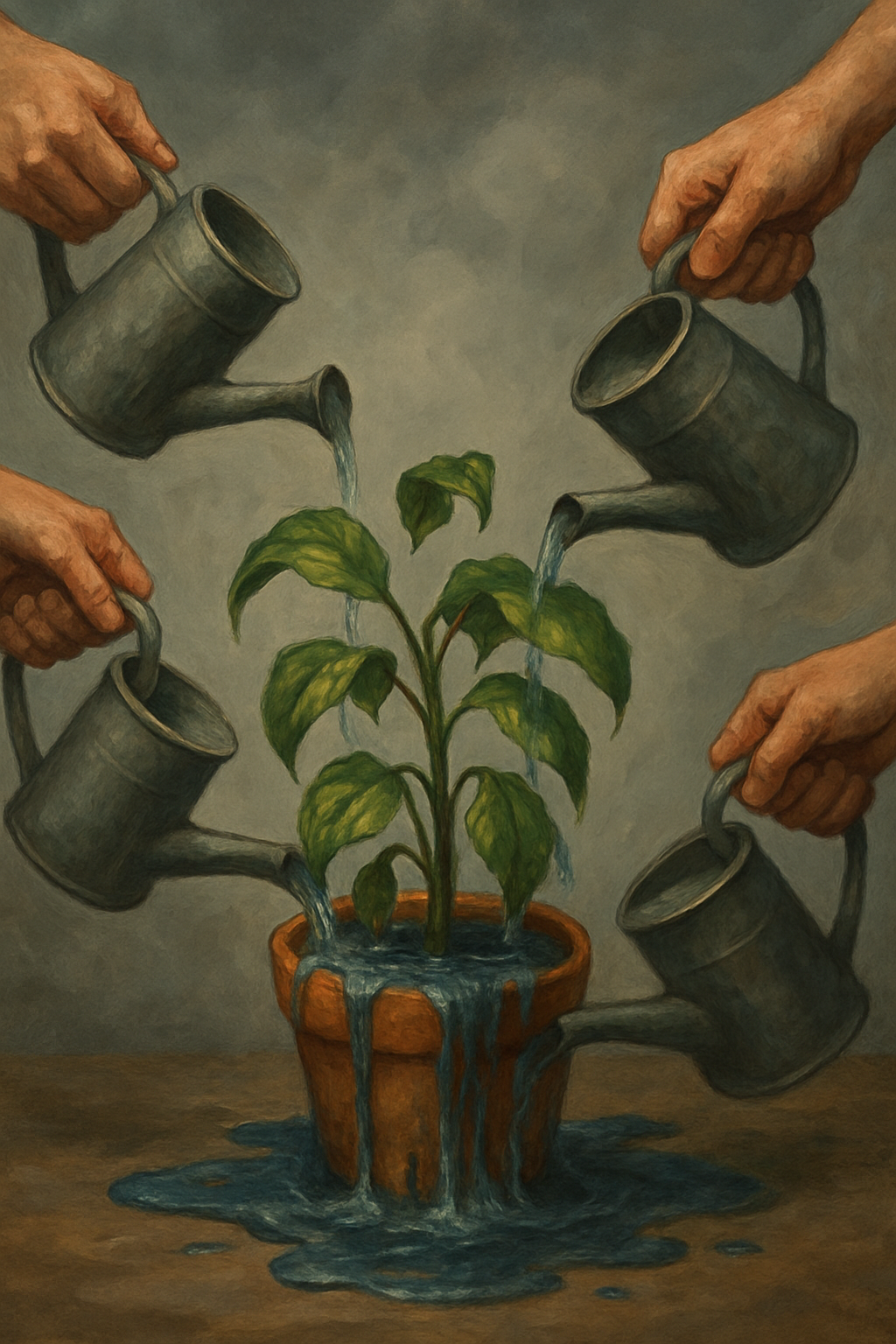Drowning in care: when overwatering life stunts your growth.
Have you ever loved something so much that you thought the only way to make it thrive was to give it everything you had? Your time, your energy, your constant attention? Maybe it was a relationship, a career goal, a friendship, or even your own healing journey. You poured into it day and night, checking on it, adjusting, analyzing; only to realize that instead of flourishing, it started to wither.
If you’ve ever overwatered a plant, you know this feeling. You wanted to help it grow, but too much water suffocated the roots. What should have been nourishment turned into drowning. And sometimes, without even realizing it, we do the same thing in our lives. We overwater situations, relationships, and even our own emotions, thinking that more effort equals better outcomes. But in reality, some things need space, patience, and trust to thrive.
The Overwatering Trap: When Too Much Becomes Too Much
Overwatering is driven by good intentions: love, care, ambition, hope. But beneath that is often something deeper: anxiety, fear, or a need for control.
In relationships, it looks like constantly checking in, trying to "fix" the other person, or taking on their burdens as your own.
In your career, it shows up as micromanaging, overworking, or refusing to let go of a project because you’re afraid it won’t succeed.
In self-growth, it’s the endless cycle of self-improvement, where nothing ever feels like enough, you’re always reaching for the next thing, afraid to pause.
We tell ourselves that if we just do more, we can prevent failure, disappointment, or loss. But the truth is, some things grow best when we step back and allow life to unfold naturally.
Therapy Perspective: The Power of Dialectical Thinking
One of the key concepts in Dialectical Behavior Therapy (DBT) is wise mind—the balance between logic (rational mind) and emotion (emotional mind). When we overwater situations, we’re often stuck in emotional mind, driven by fear, urgency, or the need for control.
Here’s how to shift into wise mind:
Ask yourself: Is my effort actually helping, or is it driven by anxiety?
Challenge your thoughts: Am I giving this space to breathe, or am I smothering it?
Trust the process: What would happen if I let go just a little and allowed things to unfold?
Sometimes, the best thing we can do for our relationships, goals, and mental health is to trust that growth happens even when we’re not actively forcing it.
Biblical Strategy: Trusting God’s Timing
The Bible reminds us that we are not in control—God is. When we overwater situations, we act as if the outcome is solely in our hands, forgetting that God is the ultimate source of growth and change.
“Be still, and know that I am God.” — Psalm 46:10
Being still doesn’t mean doing nothing. It means releasing the constant striving, the need to control every outcome, and learning to trust that God is working even when we can’t see it.
Another powerful reminder comes from Ecclesiastes 3:1:
"To everything, there is a season, a time for every purpose under heaven."
Not every moment is a season for action. Some seasons are for waiting, resting, and trusting. Overwatering can be our way of rushing what God is asking us to wait for.
How to Stop Overwatering Your Life
Recognize the Signs – Are you feeling exhausted, anxious, or resentful? These emotions might be telling you that you're overwatering a situation. Pay attention to them.
Set Healthy Boundaries – Just as a plant needs space to develop strong roots, relationships and personal goals need breathing room. Step back when needed.
Practice Radical Acceptance – Some things are not within your control, and that’s okay. Accepting this truth brings peace.
Pray and Release – Instead of trying to control every outcome, turn it over to God. Pray for guidance, and then trust His timing.
Learn to Rest – Just like soil needs time to absorb water before the next watering, your soul needs time to rest and recharge. You don’t have to do something every second.
Final Thought: Let It Breathe
When a plant is overwatered, its roots can rot. What was once a well-intended act of care turns into something that weakens its foundation.
Now, ask yourself: Where in my life am I overwatering?
A relationship that needs space?
A goal that needs time to unfold?
My own self-worth, which needs acceptance instead of constant self-improvement?
Maybe today, instead of adding more water, you need to pause, breathe, and trust that growth is happening—even when you’re not in control.
Sometimes, the best thing you can do for something you love… is to let it breathe.
